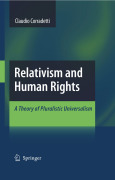
This book advances a post-metaphysical model for testing the validity of human rights principles. It takes into account some of the most recent researches in the field of cognitive linguistics and ethics in order to ground a deliberative model based upon the Kantian reflective judgment. Even if specifically suited for academics and research scholars, it can profitably be adopted as a supplementary textbook in masters and doctoral programmes. As a unique contemporary contribution to the understanding of the conceptual status of human rightsprinciples, this work represents an invaluable instrument also for the activities conducted at research centres and think-tanks. Indeed the abstract premises of the book are oriented to a more and more concrete underpinning of the contemporary human rights challenges as those faced by public officials involvedin human rights project cooperation. Specifically suited for academics and research scholars, but adoptable as a supplementary textbook for master’s and doctoral programmes A unique contemporary contribution to the understanding of the conceptual status of human rights principles An invaluable instrument also for the activities conducted at research centres and think-tanks INDICE: From the contents Introduction. Part One. 1. Cognitive Relativism And Experiential Rationality. 2. Beyond Moral Relativism And Objectivism. PartTwo. 3. Human Rights And Pluralistic Universalism. 4. The Legal Dimensions OfHuman Rights. References.
- ISBN: 978-1-4020-9985-4
- Editorial: Springer
- Encuadernacion: Cartoné
- Páginas: 165
- Fecha Publicación: 01/06/2009
- Nº Volúmenes: 1
- Idioma: Inglés
